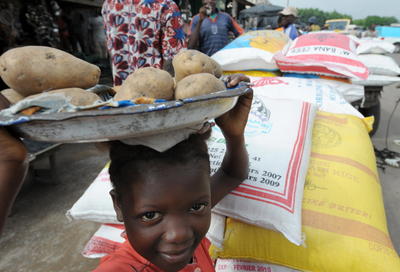as leaders fell back on promises and plans without firm measures to implement them.
The Summit did agree on some new policies, including the development of a US$100 million Agresults Fund. Overall the development agenda was reminiscent of the 2011 Cannes summit, which was marked by former president Sarkozy’s rhetoric that French chairmanship would tame food-price volatility and lead to greater food security. So far little has been actually achieved. Failure at two consecutive summits to achieve change in this area suggests that the current approach to ending food insecurity is not working. New and fresh perspectives are needed.
In 2011, and again in 2012, the G20 agenda has called for a focus on food-price volatility as a lens to examine food security. But for the 925 million hungry people in the world — 906 million of whom live in developing countries — the main concern is where their next meal will come from, not what the US stock market is doing.
Agriculture is the major source of growth in developing countries, and increasing agricultural productivity is central to increasing food security. According to the Australian aid agency, AusAID, a 1 per cent increase in agricultural yields reduces the number of people living on less than US$1 a day by 0.6 to 1.2 per cent. The UN report Agroecology and the Right to Food states that increasing investment in small-scale agriculture would double food production in 5–10 years in the parts of the world where food is least secure.
Small-scale producers are the dominant group among the food insecure and the World Bank estimates that 75 per cent of those living in poverty. Of those living in poverty, 95 per cent of their land is less than 10 hectares and are dependent upon agriculture to feed themselves. Thus, improving support for small-scale producers is the most effective way to improve agricultural output and access to food.
A gender divide also exists in developing countries. Of those going hungry, 60 per cent are women and girls, despite women being responsible for producing 60–80 per cent of food. Increasing the participation of women in agriculture in developing countries is crucial for improving food security worldwide.
Jacques Diouf, the former director-general of the UN Food and Agricultural Organisation (FAO), believes that improving gender equality in agriculture is ‘crucial for agricultural development and food security’. Reducing the gender gap in agriculture can increase agricultural productivity and output, lead to greater availability of food and lower prices.
One study completed by the FAO found that, if women received the same access to agricultural resources as men did, there would be an increase in agricultural production of 20–30 per cent, lifting agricultural output in developing countries by 2.5–4 per cent. This would have a direct flow-on effect, reducing the number of undernourished people worldwide and leading to 100–150 million fewer hungry people in the world.
State and business support is needed to stimulate small-scale food production, which would ensure long-term food security for small farmers. Changing laws and policies that discriminate against women is also vital to improve their access to land and resources, which would in turn lift global food production.
Current figures indicate that less than 10 per cent of development access schemes mention gender issues, and women worldwide benefit from only 5 per cent of agricultural extension services. Improving female access to agriculture will significantly improve agricultural production, and affirmative action is needed to ensure this access is granted.
Despite the euro crisis overshadowing the development agenda items at this year’s summit, the G20 will continue to be an important forum for world leaders to discuss fresh approaches to food security. The G20 has consistently discussed food security with reference to commodity prices, but the fact that the number of hungry people continues to increase indicates that this method is not working.
It is time for the G20 to stop recycling the same discourse about commodity-price volatility and commodity speculation. Recognising women and small-scale agricultural producers, and taking decisive steps to directly benefit them, is acknowledging those who are most affected by food insecurity. New and thoughtful approaches will lead to meaningful change, and to reducing hunger worldwide. The question is whether the G20 is ready for such engagement.
Marie-Alice McLean-Dreyfus is a student at the Australian National University and was a member of the 2012 Global Voices Australian Youth Delegation.

